Herbs for a Healthy Pregnancy and Birth Part 1: Nourishment
Nutrition During Pregnancy
My pregnancy changed me in ways that I never expected. I hit the sixth week on Thanksgiving Day and naturally, on that day of days when serious feasting - pregnant or not - is more socially acceptable than any other day of the year, the ‘morning’ (aka round-the-clock) sickness hit me like a brick wall of wet diapers (excuse the metaphor if you're currently pregnant and sensitive to smells). Never had the turkey-cranberry combination sounded so vile. Never had I not wanted to eat mashed potatoes and stuffing so intensely that I went to the trouble of hiding said foodstuffs in the dark crevices of the fridge just so I wouldn’t have to acknowledge them. Never had I been so pregnant or so sick.
First trimester, I transformed from stickler and self-professed food snob of the Weston A. Price Foundation variety (hand over the liver and onions, please, and don’t you give me a grain that ain’t soaked) to a girl who woke up at 3 AM to demand her husband get her an Arby’s roast beef sandwich and then fell back asleep while reading the menu in horror that she would eat such a thing, a girl who dreamed of sushi and red wine like some dream of world peace, a girl who veered across four lanes of rush hour traffic to a Taco Bell drive thru in a panic that they wouldn't have the choco-taco that she had the last time she ate there in 1997 (they didn't). Embarrassing, but true as pumpkin pie.
And that was just the beginning. My first trimester - like so many - was a blur of nausea and feeling hungover without having had anything to drink, bad smells and bright lights, clutching my yet nonexistent belly and wondering if the piece of blue cheese I’d accidentally consumed earlier had already permanently maimed my baby or whether the poor little munchkin was instead feeling rather rough after the morning’s third miserable dry heaving session.
I knew that I needed nutrients that went above and beyond whatever trace amounts of calcium might be present in the quart of strawberry ice cream I’d had for second dinner. I just didn’t know how I was going to get nutrition down that was, well, real. Nutrition that didn’t come in a reassuringly packaged prenatal pill or look like a fortified gummy bear. Enter nourishing herbal infusions.
Real, whole food, whole herb nourishment during pregnancy is not hard to come by once you familiarize yourself with herbs like nettle and oatstraw herbal infusions.
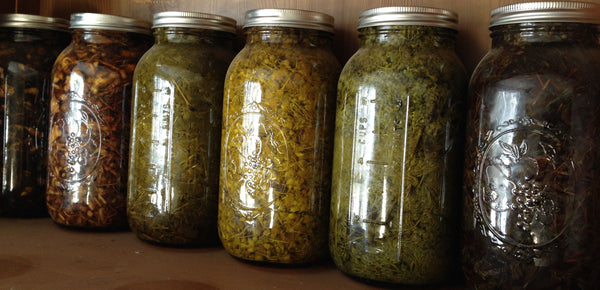
For 9 months and 2 weeks, I was the rapidly expanding pregnant lady carrying around mysterious mason jars full of formidable dark-colored liquids (now, a year later, I'm the mom carrying these same mason jars around and sharing the contents with her 7-month-old). Infusing nettles, oatstraw, red clover, and linden during my pregnancy allowed me to cope with the 'ugh' of all three trimesters with resilience, energy, and minerals - no excuse for a less-than-ideal diet, of course, but first trimester fast food cravings were a reckoning force I would have never believed in had I not lived through them. I generally infused one of these herbs every day, rotating through these five and drinking a full quart daily as religiously as I tracked my baby's size according to fruits, from bitty blueberry to whopping watermelon and beyond.
Knowing what I know about these herbs, that they can be some of the highest sources on earth of trace minerals, laden with protein, and gently immune-stimulating yet very much okay to use during pregnancy, I felt confident that I was getting so much nutrition from these that I made a personal decision to decide to pass on the (often difficult to absorb) prenatal vitamins. That's how much I trust the power of these traditionally nourishing super-herbs - but I'm absolutely not advocating this approach for everyone. Instead of the prenatal, I drank plenty of Vita-Min, the prenatal and lactation tea that we formulated specially to be mineral-laden, nutrient-dense and full of folate. This tea blend combines silica-laden horsetail, hormone-loving red clover, uterus tonifying red raspberry, iron-filled nettle, soothing oatstraw, and a pinch of refreshing mint
A note on folate: you can't get too far into a pregnancy without hearing about folate or folic acid from at least a dozen sources. Folate comes from the latin root that also begins the word 'foliage': folate in its most usable form comes from leaves! The leaves that I used to make my daily nourishing herbal infusion provided me with plenty of folate that I knew was as close to the original source as possible.
Nourishing Stinging Nettle Herbal Infusion
Often compared to the oh-so-trendy ‘green drinks’ but very different: nettles infusion is deeply nourishing and instantly assimilated and usable by the body because it is pre-digested by the drying and steeping process. Even in that highly sensitive and weirdly put-off state of first trimester, I was able to sip on cold (or even iced, for a real treat) nettle infusion, which felt like drinking in the goodness of the earth itself.
Nettle is the primo cream of the crop among nourishing tonics for anyone, but especially for pregnant mamas. Thought to be a hub of chlorophyll, nettles is also a clearinghouse for essentially every mineral and vitamin needed to grow and support life. Good quality nettle may pack a punch of potassium, phosphorous, iron, sulphur, calcium, and vitamins A-E and K.
The richly green infusion - so dark in color it resembles the color of shadowy seaweed - is instrumental in supporting, nourishing, and strengthening the kidneys, which work especially hard during pregnancy to cleanse the blood supply
Drinking nettle infusion when trying to conceive and during pregnancy may have the following benefits, and some:
- Supporting fertility, in both male and female bodies
- Easing spasms, such as charley horses and leg cramping
- Minimizing discomfort around labor and birth, easing muscles and relaxing uterine strain
- Benefitting those who experience hemorrhage and supporting the ability to maintain a healthy body after blood loss
- Supporting glowing and healthy skin, tightening and strengthening blood vessels, while maintaining elasticity of the arteries and improving venous resilience
- Supporting healthy lactation
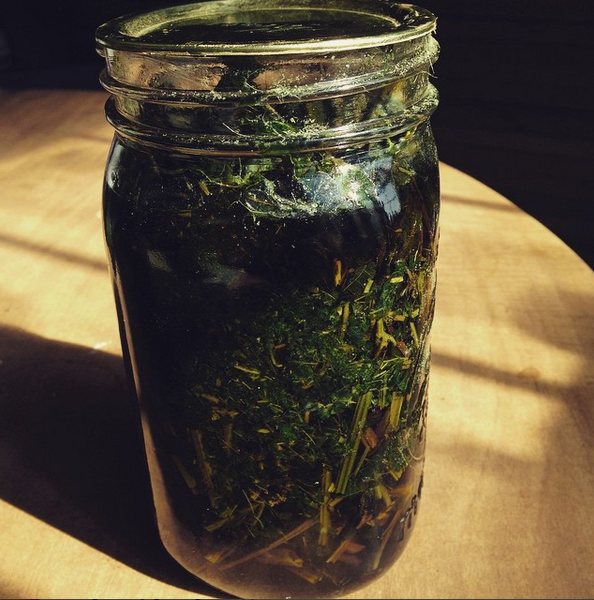
In my experience, I noticed my lackluster energy spike on the days when I drank nettles. But not in a caffeine-buzz kind of a way, in a much more even keel sort of way that feels as good as it sounds. Nettles certainly contributed to my pregnancy glow, encouraging the growth and healthy sheen of hair, skin, nails, and teeth. The muscle spasms and leg cramps I started to get in my first and second trimester (you don't know what a charley horse is until those killer middle of the night wake up calls in between pee sessions) disappeared when I drank my nettles, probably because of its ability to ease cramps. And perhaps most importantly, nettles is an incredible blood builder and oxygen-teeming tonic, preparing the body for birth and its potential trauma in a significant way.
Magnesium-Laden Oatstraw Nourishing Herbal Infusion
This was by far my favorite nourishing herbal infusion to drink during pregnancy. It’s bland-tasting, totally unoffensive to my picky nose, and even a little sweet and milky tasting due to its oaty nature. Oatstraw infusion is a powerful nervine; it has the ability to just take the edge off so that, no matter where you are in your pregnancy or what bizarre food pair cravings are plaguing your dreams, everything is just a bit more manageable.
During my first trimester, I learned the happy news that oatstraw not only promotes a calm nervous system and peaceful adrenals, which my racing about-to-be-a-first-time-mom-brain appreciated, but it is THE world's highest source of magnesium. You'll find oatstraw in just about every pregnancy tea out there, and standing alone as a strong, long-steeped infusion, oatstraw is not only delicious but replenishing and moistening to the entire body, which can be so easily depleted and made brittle by the fact that it is, in fact, busy growing an entirely new life.
As everyone who's ever been pregnant knows, getting back to sleep after the fourth potty of the night or after tossing and turning for hours trying to carve out a place for that new blossoming belly to rest is key to survival. The magnesium and calcium that oatstraw is so infused with are allies in achieving that restful, restorative sleep that your pregnant body desires.
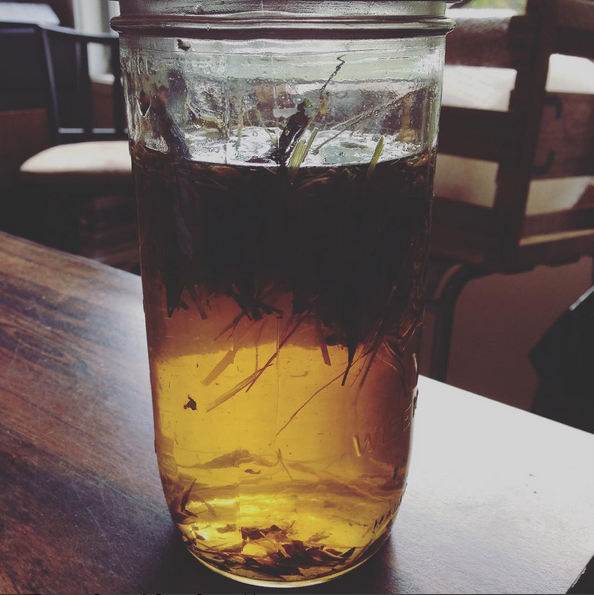
Generous in its giveaway dance of calcium, magnesium, and a heaping of other essential trace and macro minerals, oatstraw also offers its consumer steroidal saponins - a soapy phytochemical - that support digestion and a happy mood and also nourish the liver and pancreas.
Oatstraw infusion tastes slightly grassy and earthy but is more mellow than nettles. Iced and drunk chilled on a hot day, or warmed with a little honey and a splash of milk and sipped on a cold day, the infusion is quite delicious.
It is sought after by those who seek to tame the stress butterflies or nervous anxiety jitters. Deeply energizing and catalyzing of restorative sleep, oatstraw rejuvenates frazzled nerve endings from an emotional roller coaster like no other herb.
Restorative to the nervous system, supportive of emotional elasticity, and an aphrodisiac, oats and oatstraw are excellent at keeping us in a free-flowing mode. Supporting a healthy cardiac system and balanced cholesterol levels, protein-punching oatstraw infusion (the infusion being preferred in this case over tea, capsules, or extract) offers its drinker a rainbow of B-vitamins (but notably does not contain B12).
The varicose veins and other varicosities that often come up as an unexpected side effect of pregnancy often benefit from drinking oatstraw, which is used to strengthen the capillaries. Drinking oatstraw infusion provides us opportunity for bioavailable dietary and crude fiber, vitamins, A, B complex, C, and E, chromium, and soothing mucilage. These elements promotes a healthy digestive transit time and a moist, contented gastrointestinal system.
Herbal Vinegars for Minerals
Between the strawberry ice cream nights and the mornings spent eating crackers and pickle juice, I didn't feel much like I was getting my optimum nutrition from my food during my pregnancy, at least not like I had planned to. One way I compensated for this inability to eat a perfect diet (and, let's face it, all of our diets, no matter how 'clean, are somewhat imperfect) is making sure I was getting some mineral-teeming vinegar in me each day, whether cooking with it (in greens, soups, sautees etc...), mixing it with olive oil for a marinade or salad dressing, or stirring it with a little water, juice, or infusion and taking as a hearty shot.
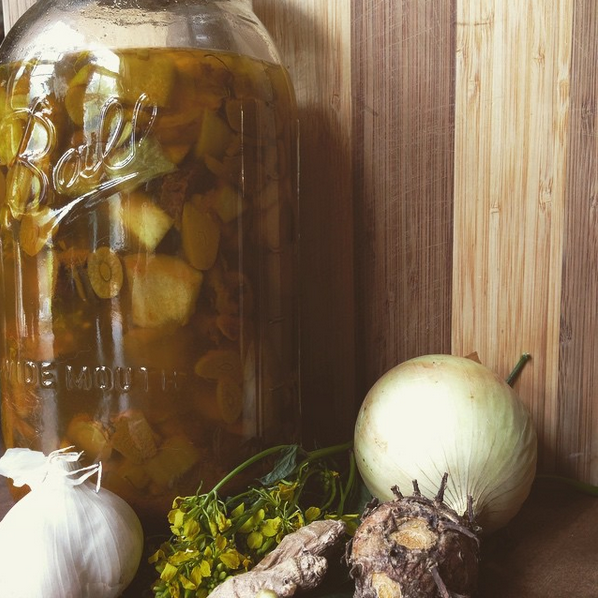
Wild greens - if you can get them down - are calcium central. Dandelion, lamb's quarter, mallow, knotweed, and amaranth are just a few weedy ones that can be found and used for this purpose.
When we take wild green herbs and steep them in vinegar for several weeks, these nutrients assimilate into the acid base, creating an easy way to get the goodness and minerals of the herbs without much effort and with lots of taste.
It is thought that soaking bones in apple cider vinegar encourages the release of calcium into the vinegar via the intense acidity. Taking this mixture by the spoonful is reported to nourish the mama and growing baby and ease nausea at any time of day.
I found this to be true; one of the few things that helped my morning sickness (along with a few drops of ginger extract) was a tonifying vinegar (or fire cider) and water shot. The benefits of herbal vinegars also include their ability to balance out the pH of the body, their helpfulness with digestive difficulties (which can be especially wonky during pregnancy), and their friendliness to the health of the gut. Maybe my baby wouldn't be a mutant grape, after all!
Herbal Resources for Pregnancy and Birth
I’d be lost without my vast collection of handy dandy pregnancy, birth, and lactation resources from MDs, NDs, and others in the natural health realm who I trust.
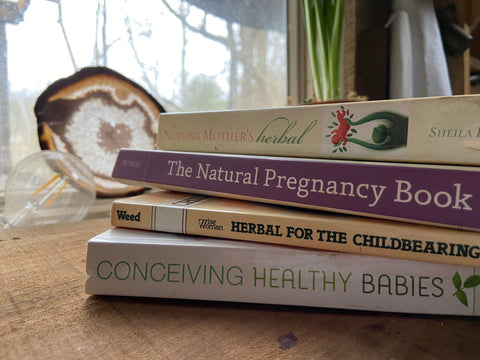
Here are a few of my absolute favorite resources for the easy and practical use of herbs during pregnancy.
- The Nursing Mother’s Herbal - this go-to manual is quite thorough and I’ve come to rely on it heavily during the 3.5 years of nursing my child thus far. It issues each herb a clear safety rating, and is also appropriate during pregnancy.
- Conceiving Healthy Babies: An Herbal Guide to Support Preconception, Pregnancy, and Lactation - whether you’re TTC (trying to conceive), pregnant, or nursing, Dawn Combs’ is a lovely person and has a lovely book full of herbal advice on everything from fertility to kombucha to milk production.
- The Natural Pregnancy Book - Dr. Aviva Romm is one of my heroines, a beloved teacher of mine, and the author of basically the ultimate guide on herbs during pregnancy. She includes rituals for celebrating pregnancy, lots of nutritional strategies, and advice on common concerns during pregnancy such as preeclampsia, stretch marks, UTIs, fatigue, and morning sickness.
- Naturally Healthy Babies and Children - another Dr. Romm classic.
List of Herbs to Keep on Hand
Nourished? Next, check out my Part 2 article on herbs for improving well-being during pregnancy.








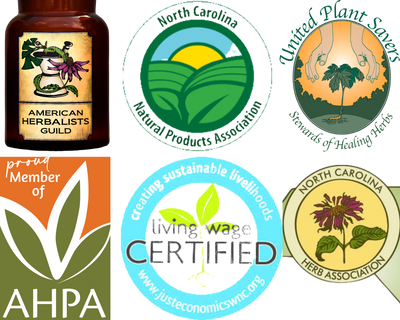
Comments
Alex said:
I see you list a tea with horsetail— is horsetail in fact safe during pregnancy in your experience? I’ve been taking 20mg since a year prior to conception & up to 18 weeks pregnant when I stopped bc I read conflicting & worrisome info on google. Any advice would be so appreciated!! I’m worried I’ve hurt the baby
Sarah said:
Hi! Great article, thank you! Wondering if you can advise whether red clover flower, lemon balm, yarrow and motherwort are OK in the final trimester of pregnancy? I have a lovely tea with raspberry leaf, oatstraw and nettle and it also has those other herbs :)
Heather Wood Buzzard said:
Melinda, thanks for reading! You can find a lot out there on proper bone broth preparation, but I like to soak my (raw, but some people do roasted) bones for about 30 minutes in a little vinegar before simmering them for several hours to make broth. Here’s a recipe! https://redmoonherbs.com/products/broth-and-immunity-kit
Heather
Melinda said:
Hello, I loved your article and am in my first trimester of my first pregnancy. I’m curious if you could expand on the bone soaked apple cider vinegar quote of Susan Weed. Do you soak the bones raw? Do you cook the bones first? Do you cook them with the vinegar? How long do they soak for? Etc.
Allyson Holley said:
Was part 2 ever published?